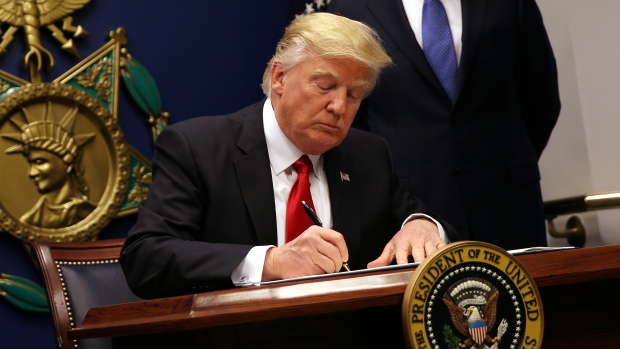
The Effect of Trump’s Travel Ban
One of the most controversial policies enacted by President Trump’s administration involves his travel ban, which was enacted shortly after his inauguration. The Executive Order barred refugees from entering the country for 120 days, and banned citizens from Iran, Iraq, Libya, Somalia, Sudan, Syria, and Yemen for ninety days. According to some estimates, between 60,000 to 90,000 individuals were directly affected by the travel ban. The issue was immediately criticized by numerous human rights and refugee activist groups, and was formally challenged by several states. Currently, the United States Court of Appeals for the Ninth Circuit upheld a temporary restraining order issued in State of Washington v Trump.
In response to Trump’s Executive Order, the Canadian Council for Refugees (CCR) brought up issues with Canada’s Safe Third Country Agreement (STCA), which allows refugees to seek asylum in Canada or the US. The STCA, which was created in 2004, assumes that both countries have fair and equitable refugee programs. However, given the Trump administration’s hostility towards refugees and other marginalized communities, the US may no longer be a safe destination. Law schools supported the initiative through a research-a-thon, gathering information that may support a legal challenge by the CCR against the STCA.
Critically, the Executive Order had a broad impact against different academic disciplines outside of law. Indeed, global health and public health advocates have vocally criticized the ban, claiming that it endangered the health outcomes of vulnerable communities. As they noted, diseases simply do not respect geographic and political barriers, and are capable of crossing borders despite intense scrutiny. For example, see the Zika virus cases in the US despite significant collaboration from different international health actors to contain the disease.
Peter Hotez, an infectious disease expert from the Baylor College of Medicine in Houston, Texas, was vocal about the travel ban’s effect on medicine in the US.
“The ban could hamper our ability to learn about the epidemiology of neglected diseases emerging out of conflict zones. … Scientific communities across the world need collaborators in these countries who can combat epidemics before they arrive in the US.”
Of course, the ban also affects scientific research in the banned countries. For example, collaborators at the US National Institutes of Health and the Pasteur Institute of Iran have stated that the ban may negatively influence communication and research meetings in the long term. The ban disrupted their vaccine research on leishmaniasis, a parasitic diseased that is caused by Leishmania donovani and that is fatal if left untreated.
The ban also impacted Sudan’s Mycetoma Research Centre, which is the world’s only research centre devoted to the tropical disease. Ahmed Fahal, the director of the Research Centre, was supposed to visit the US Centres for Disease Control and Prevention to discuss mycetoma monitoring and to find research partners. These plans may also be put in jeopardy.
As Hotez and many other public health professionals noted, it takes an international effort to combat international disease outbreaks. The Ebola outbreak was not solved by restricting travel and enforcing borders; it was addressed by providing aid and by facilitating cross-country research.
Trump’s travel ban could also affect the arts. Navid Kermany, a prominent German-Iranian writer and Islam scholar who was awarded the Peace Price of the German Book Trade in 2015, and artist Kani Alavi, who painted sections of the Berlin Wall in 1990, could not effectively travel to the US following the order. Opportunities to collaborate artistically, much like scientific research, require movement and communication across borders, and restrictions only serve to hinder the spread of artistic achievements. As noted by Olaf Zimmermann, the head of Germany’s association of cultural institutions, “The international cultural exchange will be severely curtailed due to these measures.”
Overall, the issue of closed borders is interdisciplinary, affecting countless lives and numerous institutions. Whether it’s the sciences or the arts, society benefits from the unhindered exchange of ideas and people, and society is conversely harmed when this exchange is restricted. President Trump’s Executive Order emphasized these common connections, creating unlikely forums for different actors to voice their concern. Although the damage was severe, some are taking advantage of the frustration and backlash to consolidate power against the Trump administration.
